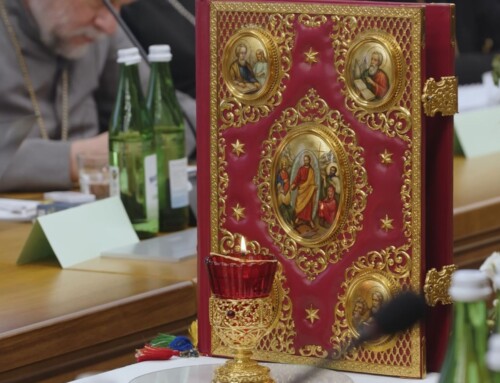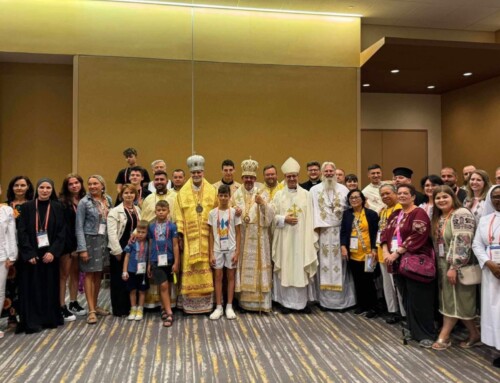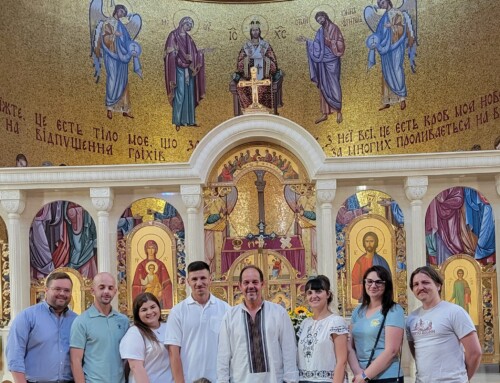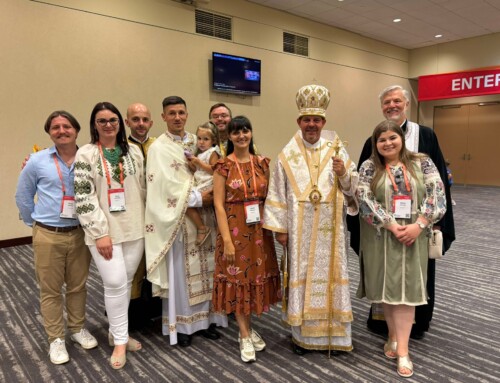SAINT PHILIP’S FAST PASTORAL OF THE UKRAINIAN CATHOLIC HIERARCHY IN THE US
“Behold, I am about to do something new!
Now it already springs forth; do you not see it?
(Is. 43:19)
Dear Brothers and Sisters in Christ,
We are commencing the Fast of St. Philip, embarking on a journey that culminates in the contemplation of an indescribable mystery – God’s condescension to humanity. It is at the Nativity of Our Lord that God draws near to us, for “In the union of the divine and human, ‘the incorporeal one takes on flesh, the Word becomes approachable, the invisible one is seen, the impalpable one is touched, the one beyond time enters time, the Son of God becomes the Son of Man.’” (Christ Our Pascha, §179). In this divine event, God not only reveals His name but also makes Himself visible, inviting us to recognize Him.
For the second consecutive year, we, Ukrainians in the US, find ourselves preparing for Christmas amidst a full-scale war with the Russian aggressor. Our Ukrainian soil is soaked in the blood of heroes, and our cities and villages under occupation are shrouded under the black pall of the “Russian world.” We continually pose questions to each other and to God: “How much longer will this endure? Why, O God, does this war persist?”
Let us consider the circumstances in which our Lord came to the world. Humanity, perpetually anxious and born in fear, anticipated the coming of the Messiah, each person harboring their own expectations of His identity. Who among them recognized Him as the “something new [that] springs forth,” as prophesied by the Prophet Isaiah? (Is. 43:19) The initial witnesses to the choir of angels were humble shepherds, for “Many are the high and exalted, but God reveals his mysteries to the humble.” (Sir. 3:19)
Blessed are the pure in heart, for they shall see God (Matt. 5:8). Pure in heart shepherds became the symbol of those who were capable to see God. However, the path to purity of heart is arduous, demanding profound introspection. We often find ourselves dissatisfied with our circumstances. This war, while manifestly physical and visible, also has deep spiritual ramifications. We yearn for change, for someone to rise against injustice and corruption, yet we tend to overlook that the journey begins within ourselves, with our heart.
“Behold, now is the acceptable time; behold, now is the day of salvation.” (2 Cor. 6:2) The day of salvation marks the inception of our inner journey. The Apostle Paul calls us to bear witness, to be people of hope who endure “in steadfast perseverance; in afflictions, hardships, and distress.” As we embark on the path to the Nativity, we strive to “open wide our hearts” (2 Cor. 6:13).
The time is opportune for us to begin. Our first task is the transformation of our hearts. When we delve into the lives of the saints, we often marvel at how they found spiritual equilibrium amidst sorrow, mastering themselves and receiving the strength of Christ, “who by faith conquered kingdoms, administered justice, and obtained promises. They closed the mouths of lions, quenched raging fires, and escaped the edge of the sword. Their weakness was turned into strength…” (Heb. 11:33-34) Today, our front-line defenders demonstrate that heroes are not born but are instead forged through daily toil and self-sacrifice, proving their unwavering commitment to our homeland.
As we commence this journey to the Nativity, we invite you to fathom the depths of this mystery. A single child altered the course of human history with His birth. The tapestry of human history is interwoven with the thread of Jesus Christ. We are also capable and called to change our personal stories and big history. When we gather in the Name of Jesus Christ, each one of us can contribute with the gifts bestowed upon us by the Lord, thereby effecting change in the world around us.
The venerable Metropolitan Andrey Sheptytsky, in his address to the faithful on Christmas Day 1942, amidst the tumult of the Second World War, exhorted us to struggle: “Those who, with Christ, have battled the passions that lead to sin within their own hearts, who have tasted the power of Christ in victories over themselves, do not merely believe in Christ’s victory but know it from personal experience… the cause of our sorrow will pass, and the day of joy will dawn.”
Dear brothers and sisters, during this Nativity fast, we urge you to engage in intentional spiritual exercises aimed at overcoming sin in your lives, leading you into the battle for the purity of your hearts. As Jesus teaches, “For from the heart come evil thoughts, murder, adultery, fornication, theft, perjury, slander.” (Matt. 15:19)
Much work lies ahead, but it is the sole path to a genuine experience of the Nativity of Our Lord. We are called to comprehend the gift of patience, for in God’s timing, everything unfolds according to His divine plan. While we may ardently desire swift change and accomplishment, true transformation occurs when we cooperate with God’s grace, serving our neighbors with fervor “in afflictions, hardships, and distress.” Thus, we become like those who are “sorrowful, yet always rejoicing; poor, yet making many rich; having nothing, yet possessing everything.” (2 Cor. 6:4-10)
At the liturgical prayers of the Feast of the Nativity, the Church proclaims, “For the Father’s express Image, the Imprint of His eternity, takes the form of a servant, and without undergoing change He comes forth from a Mother who knew not wedlock. For what He was, He has remained, true God: and what He was not, He has taken upon Himself, becoming man through love for mankind.” (Stichera of the Great Vespers of the Nativity of Our Lord)
The radiant light of God will illuminate our countenances, and our virtuous deeds will shine as the star of Bethlehem, guiding us to the manger where the Savior of the world lies.
+ Borys Gudziak
Metropolitan Archbishop of Philadelphia
of the Ukrainian Catholic Church in the USA
+ Paul Chomnycky
Bishop of the Eparchy of Stamford
+ Benedict Aleksiychuk (author)
Bishop of Saint Nicholas Eparchy of Chicago
+ Bohdan Danylo
Bishop of Saint Josaphat Eparchy of Parma
ПАСТИРСЬКЕ ПОСЛАННЯ ЄРАРХІВ УКРАЇНСЬКОЇ КАТОЛИЦЬКОЇ ЦЕРКВИ США
НА ПИЛИПІВКУ
«Ось я творю щось новітнє: воно ось-ось уже сходить.
Чи ж ви його не впізнаєте?»
Іс.43.19.
Дорогі брати і сестри у Христі!
Розпочинається Різдвяний піст — духовна мандрівка, яка завершується спогляданням невимовного таїнства наближення Бога до людини. Саме у Різдві Бог стає ближче до нас, бо «у єднанні божественного і людського Слово стало досяжним, Невидимий – видимим, до Недоторканного можна доторкнутися, Позачасовий увійшов у час, Син Божий став сином людським» (Христос Наша Пасха §179). У Різдві Бог об’являє вже не лише своє ім’я, але дає можливість себе побачити, прийняти і визнати.
Уже другий рік поспіль ми, українці в США, готуємося до Різдва Христового в умовах повномасштабної війни з російським агресором на Батьківщині наших предків. Українська земля напоєна кров’ю героїв, а міста і села під окупацією вкриті чорним веретеном «руского міра». Ми запитуємо себе «Скільки це ще триватиме?» і питаємо Бога: «Боже, чому Ти не зупиниш війну?»
Звернімося до обставин, у яких Бог прийшов у світ. Людство під впливом постійного неспокою, породженого страхом, очікувало на прихід Месії, але у кожного були свої уявлення, яким він має бути. Хто впізнав те «новітнє», що «ось-ось уже сходить», про яке писав пророк Ісая (Іс.43.19)? Найпершими свідками співу хору ангелів були убогі пастухи, адже було і є «багато високих та славних, але Бог відкриває тайни свої скромним» (Сир. 3,19).
Блаженні чисті серцем, бо вони Бога побачать! (Мт 5,8). Чисті серцем євангельські пастухи стали символом тих, хто зумів побачити Бога. Дорога до чистоти серця є непростою. Вона вимагає надвеликої праці, вміння зазирнути у глибину свого єства. Нас часто не влаштовують обставини, в яких ми перебуваємо. Війна, наслідки, якої ми бачимо, є не лише фізичною, але й духовною. Ми хочемо змін від інших, прагнемо, щоб хтось почав боротися з несправедливістю, корупцією та іншими проявами зіпсуття, але забуваємо, що ці зміни розпочинаються з самопізнання і самовдосконалення.
«Ось тепер – час сприятливий, ось тепер – день спасіння.» (2Кор. 6,2). День спасіння є початком руху до себе. Апостол Павло запрошує нас свідчити, бути людьми надії у «великій терпеливості, скорботах, у нуждах, у тіснотах. Дорога до Різдва – це час сприятливий, у якому ми працюємо над тим, щоб зробити «широким наше серце» (2Кор. 6,13).
«Час сприятливий» спонукає нас до дії. Спочатку треба преобразити наші серця. Коли читаємо Життя святих, нас дивує, як в тяжких скорботах, ці люди знаходили рівновагу духу, опановували себе і силою Христовою, вірою «підбили царства, чинили справедливість, обітниць осягнули, загородили пащі левам, силу вогню гасили, вістря меча уникали, ставали сильні» (Євр.11.33-34). Сьогодні наші захисники і захисниці на фронті показують, що героями не народжуються, а стають: ті, хто щоденною важкою працею та самопожертвою засвідчують вірність нашій Батьківщині.
Розпочинаючи дорогу до Різдва Христового, запрошуємо Вас вдивлятися у глибину цього таїнства. Одна маленька дитина своїм народженням змінила історію усього людства. Історія людства і є історією Ісуса Христа. Ми також можемо і покликані змінювати хід подій у наших малих історіях та у великій історії. Коли ми зібрані в Ім’я Ісуса Христа, кожен може послужити своїми Богом даними талантами, таким чином змінюючи світ довкола себе.
Праведний Митрополит Андрей Шептицький у зверненні до вірних на Різдво Христове 1942 року, в часі Другої світової війни, закликає до боротьби: «хто з Христом навчився боротися у власному серці з пристрастями, що ведуть у гріх, хто досвідчив Христової сили в перемогах над собою самим, той не тільки вірить, що Христос перемагає, але знає з власного досвіду… Причина смутку перемине і настане день радости».
Дорогі брати і сестри, у часі цього різдвяного посту, запрошуємо вас поставити собі конкретні завдання, які допоможуть найперше перемогти гріх у житті, розпочати боротьбу за чистоту свого серця, бо «із серця бо походять лихі думки, убивства, перелюби, розпуста, крадежі, лживе свідчення, богохульства» (Мт. 15,19).
Праці є багато, але це єдиний шлях достойно зустріти Різдво Христове. Нашим покликанням є збагнути дар терпеливості. У Бозі все відбувається вчасно, хоча по-людському нам би хотілося швидко усе змінити, досягнути, здобути. Зміни відбуваються тоді, коли ми співдіємо з Божою благодаттю, бачимо і ревно служимо своїм ближнім у «скорботах, у нуждах, у тіснотах», як ті, що: «сумні, та завжди веселі; як бідні, а багатьох збагачуємо; як ті, що нічого не мають, а все посідаємо. (2Кор. 6:4-10).
Літургійна молитва Церкви оспівує «Незмінний образ Отця і відблиск його істоти приймає вигляд слуги; прийшовши від пречистої матері, він не зазнав жодної зміни. Бувши правдивим Богом, він зостався тим, чим був, і приймає те, чим не був, ставши людиною заради чоловіколюб’я» Стихира на Вечірні празнику Різдва ГНІХ.
Відблиск Бога має засяяти на наших обличчях, а наші добрі справи, повинні стати зорею, яка вестиме нас до ясел, в яких спочиває Спаситель світу.
+Борис Ґудзяк
Архиєпископ Філадельфійський
Митрополит Української Католицької Церкви у США
+Павло Хомницький
Єпископ Стемфордської єпархії
+Венедикт Алексічук (автор)
Єпископ Чиказької єпархії святого Миколая
+Богдан Данило
Єпископ Пармської єпархії святого Йосафата




